MISINFORMATION ABOUT EAC MANDATE. A campaign of misinformation by the DRC government including by president Tshisekedi has led to hate speech and targeted violence against the EAC peacekeeping regional force deployed in Eastern DRC. This has posed a threat to the EAC peacekeepers and to the peace mandate whereas the EAC was tasked to mediate between actors involved in the crisis, namely the DRC government and the M23, but also to support the demobilization of armed groups operating in Eastern DRC.
This issue of misinformation was raised by Major General Silver Kayemba from UPDF (Uganda People’s Defense Force) currently serving as the Military Attaché at Uganda’s Permanent Mission to the United Nations in New York. He declared, during the 2023 UN Peacekeeping Ministerial Preparatory Conference which took place on October 25 in Kigali: “When we are given a mandate permission, there are tasks, and tasks are made according to the way the mission is constituted… Because I have seen a host nation where it has told a delegation that “your mission should leave because you are not doing what brought you here. What brought you here is to engage the negative forces. But when you look at the mandate, the mandate is not saying that. The mandate does not allow you to go into fighting. But the host nation is expecting you to do that. The host nation’s government. Now this takes me to misinformation. Because the host nation is saying we must fight. The population also says ‘you must fight!’. So as you leave the capital where the government says you must fight or you leave, the population turns against you. This causes insecurity to the forces you are going to deploy because of misinformation. You are talking about misinformation in the society, but there is misinformation of the leadership. The host nation has a role to tell its people that the mandate of this mission does not allow them to fight. If they don’t inform the people, then the people turn into a hostile society against the peacekeepers. We have seen this.”
JEAN-LUC MELENCHON attempts to establish himself as an international politician by visiting DRC and speaking out on the situation in Kivu. The founder and leader of far-left party France insoumise, a follower of the colonial-inspired trend of socialist French president François Mitterand, who supported the Habyarimana regime which has perpetrated the 1994 genocide against the Tutsi in Rwanda, he has traveled to Kinshasa to endorse President Felix Tshisekedi’s presidential campaign. Melenchon’s remarks show his unwillingness to consider the principle causes of the DRC, that is to say, the reasons for M23 rebellion, namely the persecution of Tutsi minorities forced to flee for three decades to neighboring countries, and the presence of over 260 armed groups, causing along with the national army FARDC, the overwhelming majority of human rights violations and of the Congolese ills.
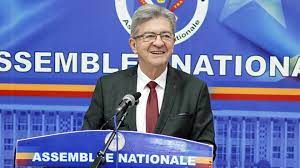
Melenchon wilfully omits the provocations of President Tshisekedi, who in an official statement on 4 December 2022, vowed to support regime change in Rwanda, and who has been meeting, since the beginning of the year, with those seeking to engineer regime change in Rwanda, and the most extreme genocide ideology advocates, namely Eugene-Richard Gasana, Padri Thomas Nahimana, Charles Onana, or Justin Bitakwira. Jean-Luc Melenchon takes advantage of this international platform, and the call of his party LFI for a resolution at the French Parliament in July 2023, to push further the political agenda and support of genocide ideology aginst the Tutsi that has served as an alibi for generations of shaken Congolese leaders, to officially accuse Rwanda of “aggression” and “invasion”.
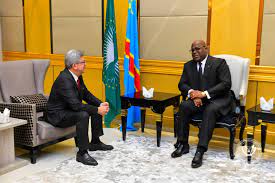
FELIX TSHISEKEDI’s reelection campaign fuels hate and xenophobia. Before meeting twice in Kinshasa and New York in the last few months with the Rwandan Eugene-Richard Gasana who has been seeking support to overthrow the current Rwandan government, Tshisekedi vowed to help support FDLR, the force which has perpetrated the 1994 genocide against the Tutsi in Rwanda, to implement regime change in Rwanda. The Congolese president indeed declared in an official statement on national TV on 4 December 2022: “it’s the Rwandan regime with Kagame at its head which is the enemy of the Congo… [Rwandans] need our help to liberate themselves… Do not see them as enemies but as brothers who need our solidarity to get rid of such leaders here and in Africa …” The expression “liberate themselves” is a clear reference to FDLR (Democratic Forces for the Liberation of Rwanda) which has since 2022 received direct support from the Tshisekedi regime, as evidenced in the December 2022 UN Group of Experts midterm report S/2022/967 and the June 2022 final UN Group of Experts report S/2023/431.
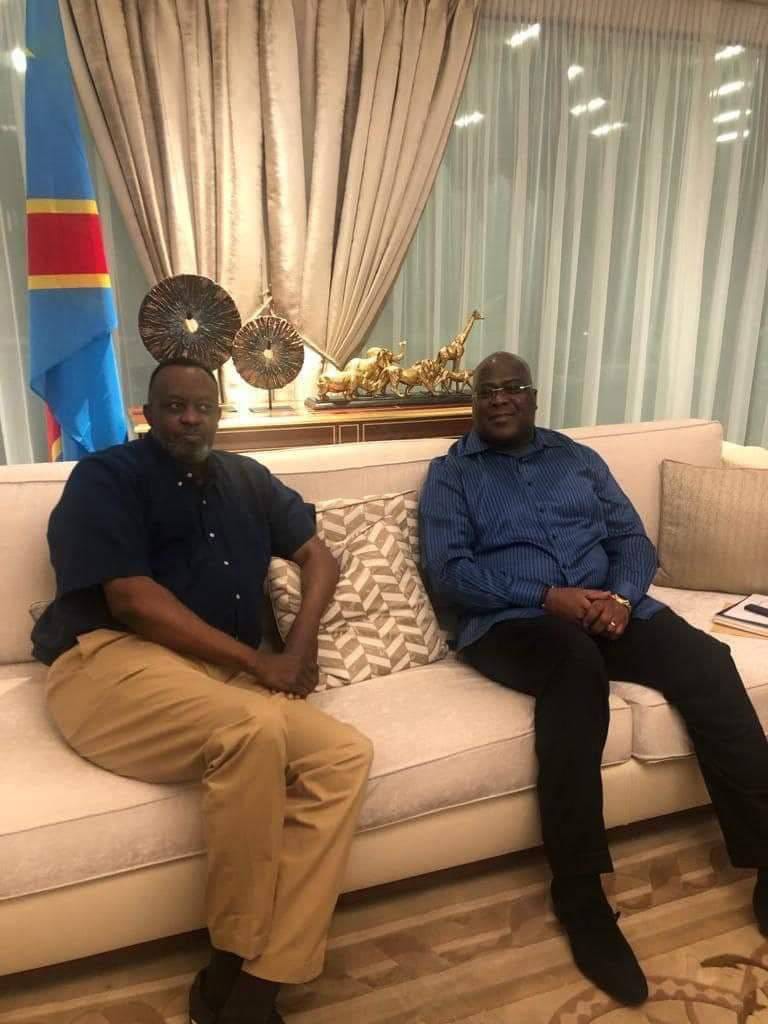
As shown in these reports, the DRC government has, since 2022, coordinated a coalition of armed groups including FDLR, Nyatura, APCLS, NDC-R led by Guidon Shimiray who is wanted for horrific crimes against civilians since 2019 who are targeting M23 which they present as a Rwandan force. DRC’s direct support of the genocidal force FDLR and the armed groups joining forces with FDLR has subsequently presented a direct threat to the safety of the Rwandan people. Tshisekedi has additionally appointed Major General Peter Crimwami as interim Military Governor, known as the mastermind of the “Pinga agreement”, detailed in the S/2022/967 Group of Experts report, whereby FARDC, FDLR, Nyatura, and Mai Mai armed groups forged an alliance to fight against M23 and Rwanda, designated as “Nilotic”, in reference to the 19th century “Hamitic theory”, which is based on colonial scientific racism, and which has led to the 1994 genocide against the Tutsi in Rwanda.
Following his plan to cooperate with anyone willing to overthrow the Rwandan government, Tshisekedi met last month with Padiri Thomas Nahimana, considered as the president of the Rwandan government in exile. The group is composed of genocide perpetrators, genocide deniers, and children of genocide perpetrators, who support the FDLR, created by those who participated in the 1994 genocide against the Tutsi in Rwanda, and who are today integrated into the Congolese national army.
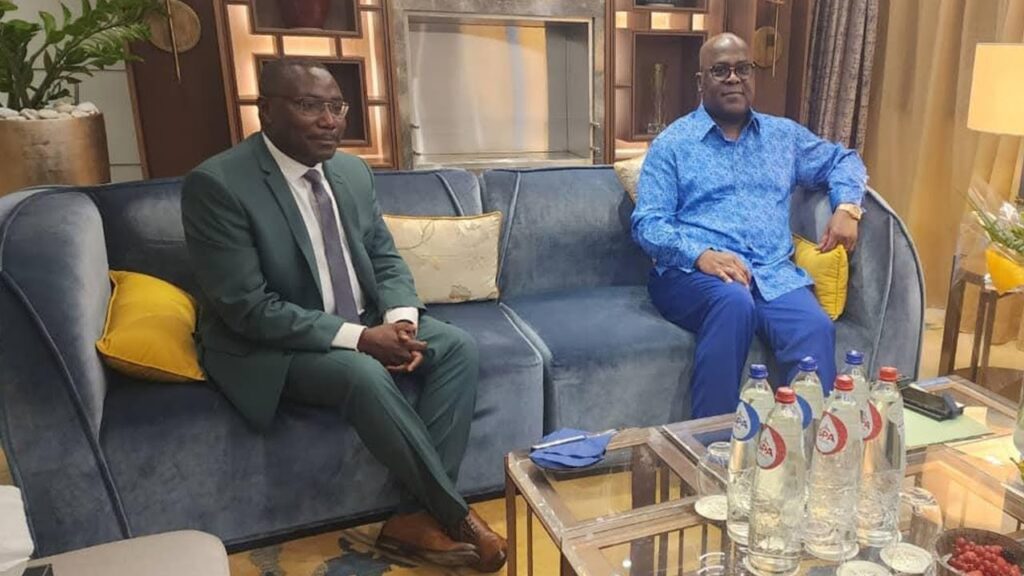
In September Tshisekedi met with the genocide denier and revisionnist Charles Onana who is currently facing a lawsuit in France for denying the genocide against the Tutsi and who is known for fueling extreme Tutsiphobia in DRC. His books are designed to openly incite hate whereby for instance he claims that “Tutsi women are spies of the Rwandan government”. This is a tragic reminder of the systematic mass rape and mutilation of Tutsi women during the 1994 genocide against the Tutsi in Rwanda, and Onana’s statement clearly puts at risk Rwandan women around the world.
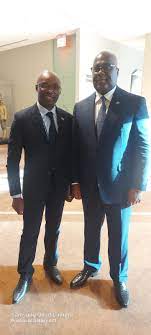
In his December 4 statement, Tshisekedi calls the Rwandan president “devil”. This is an implicit reference to the anti-Tutsi hate propaganda which conditioned Rwandan masses from 1990 to 1994 to believe such racist stereotypes, based on antisemitic myths and imagery, and which eventually led to the mass killing of close to one million Tutsi in 1994 in Rwanda. In his quest for support against the Rwandan government, Tshisekedi met multiple times with MP Justin Bitakwira, former DRC Prime Minister, who is expressly cited in the December 2022 Group of Experts report as a major actor of hate speech targeting Rwandophone communities, and who in December 2022, declared on TV “When you see a Tutsi, he is a criminal… A born criminal… I ask myself if the one who created [the Tutsi] is not the one who created the devil. I’ve never seen such a wicked race.” In July in a conference in Kinshasa, Bitakwira targeted the presidents of Kenya and Uganda making xenophobic comments about their physiological features, a clear reference to the Hamitic theory which led to the anti-Tutsi pogroms in Rwanda in the 1950’s, 1960’s, 1970’s, and to the 1994 genocide. Bitakwira declared: “Do you know that Musevini was born in Butare. He is a Tutsi from Rwanda. But he is a president in Uganda. Have you ever seen the morphology of Ruto? Have you looked closely? … I know all the tribes from Kenya. And when you hear about the Hima empire, that’s what it is. He can be called Ruto or Musevini or Kagame, it’s between them. You know West Africa well, right? Do you know that the majority of West African presidents, all of them, the majority are Fulani. The Fulani are the Tutsi of West Africa… The Tutsi have woven a spider web here [in DRC]”.
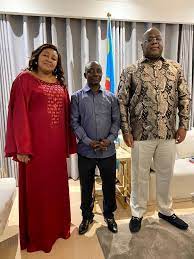
MONUSCO SILENT ABOUT MAIN CONFLICT ACTOR. The MONUSCO leadership, represented by Ms. Bintou Keita, despite evidence it has provided in its latest UNJHRO report, keeps silent about the main conflict actor, namely, the DRC government through its national army and police. This silence engages the responsibility of the United Nations peacekeeping mission in operation in DRC since 1999. This latest MONUSCO report on human rights violations against civilians indicates an increase in human rights violations by state agents (FARDC and PNC) including in North Kivu where the attacks against M23 by FARDC-armed groups coalition are currently taking place. According to the report, the DRC army and police are by themselves responsible for 40% of the human rights violations, and the other official number of 266 armed groups in operation are responsible for the remaining 60%. This report makes no mention of human rights violations having been committed by M23 during the reporting period. This information demonstrates that the breaching of the ceasefire by FARDC through the use of heavy artillery in coalition with the armed groups operating in DRC (including Mai-Mai, FDLR, Nyatura), with the European mercenaries, and the so called civilian “patriots” who took up arms to fight against the M23, is fully unjustified.
MONUSCO leadership is therefore silent about: a) FARDC or the DRC government being the single most violent actor against civilians in the DRC; b) The DRC government with its army being the number one driver of conflict on its own territory; c) The DRC government having breached the ceasefire attacking positions from which the M23 has retreated and that are under EAC supervision; d) The DRC government defying the peace process by attacking civilian-inhabited areas, which continues to exacerbate the refugee crisis, pointed out by MONUSCO in the above-mentioned report.